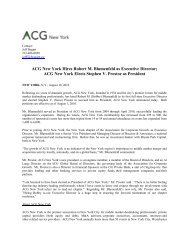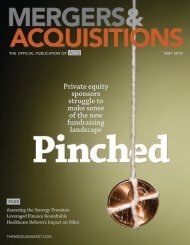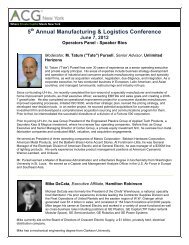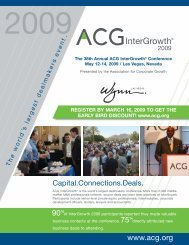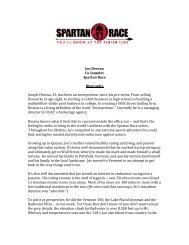Not one to mince words, KPS Capital's Michael Psaros offers a ...
Not one to mince words, KPS Capital's Michael Psaros offers a ...
Not one to mince words, KPS Capital's Michael Psaros offers a ...
- No tags were found...
You also want an ePaper? Increase the reach of your titles
YUMPU automatically turns print PDFs into web optimized ePapers that Google loves.
10-19_Watercooler.qxd 4/6/09 5:37 PM Page 16Water Coolerwhat players in the midmarket are talking aboutBeltwayMoni<strong>to</strong>rIS TARP ALIENATING PRIVATE EQUITY? It is anotherexample of government agencies working at cross purposes:Regula<strong>to</strong>ry moves designed <strong>to</strong> coax private equitym<strong>one</strong>y in<strong>to</strong> the banking system are being undercut by the TreasuryDepartment’s Troubled Asset Relief Program.Certainly, some private-equity firms are not raising m<strong>one</strong>yas quickly as they once did, and others are skittish after watchingothers’ investments in banks evaporate. But sources said thegovernment itself has become an obstacle by investing some$250 billion in banks.“The reason why there haven’t been a lot of transactions announcedso far is, very simply, Tarp,” says Wilbur Ross, the billionaireinves<strong>to</strong>r and chief executive of the private-equity firm WLRoss & Co. The government has been “spraying m<strong>one</strong>y in<strong>to</strong> alot of banking institutions and quite consistently on more generousterms than private equity would do,” he said.Mr. Ross said he talks <strong>to</strong> “a couple of banks” every day aboutmaking an investment but has yet <strong>to</strong> pull the trigger. “We’re hopeful<strong>to</strong> do [a deal] in the immediate future,” he said, “but whetherthat’s days or weeks or months, it’s hard <strong>to</strong> tell.”In November, the agency established rules <strong>to</strong> make it easierfor nonbanks <strong>to</strong> buy troubled or failed banks. With a shelf chartera nonbank can bid on failed banks before becoming a bankholding company. Before that, in September, the Federal ReserveBoard loosened a bank holding company rule <strong>to</strong> let inves<strong>to</strong>rstake larger stakes in banks without registering as a bankholding company. The rule also permits minority inves<strong>to</strong>rs <strong>to</strong> havemore influence on bank boards.Though regula<strong>to</strong>rs do not keep track of new capital movingin<strong>to</strong> banking from the private sec<strong>to</strong>r, several private equity firmshave shown more interest. With that said, this interest has yet <strong>to</strong>translate in<strong>to</strong> a flood of capital moving in<strong>to</strong> the sec<strong>to</strong>r.“There’s still m<strong>one</strong>y there potentially <strong>to</strong> be invested,” saidV. Gerard Comizio, a partner in Paul, Hastings, Janofsky &Walker LLP. But “the combination of the Tarp program andsome of the receivership actions [has] caused private equity <strong>to</strong> takea step back before jumping in,” he added.Brian Sterling, a principal and the co-head of investmentbanking at Sandler O’Neill & Partners LP, said among inves<strong>to</strong>rs’biggest concerns is that if they buy a bank stake nowtheir investment could be diluted or wiped out by a governmentcash infusion later.The limitations on control over companies in which theyinvest are also giving pause <strong>to</strong> some private equity firms. A conditionof the Fed’s relaxation of its holding company requirementswas that private-equity inves<strong>to</strong>rs own no more than 15%of a company’s votings<strong>to</strong>ck.“In an environmentwhere an equityinves<strong>to</strong>r is looking <strong>to</strong>make an investmentin a distressed bank,it’s still a non-controlinvestment,” saidJoseph J. Thomas, amanaging direc<strong>to</strong>r atHovde Private EquityAdvisors. “You’rerestricted on the numberof board seats, andyour economic controlis capped at athird or 25% insome cases. Manyfirms look at that andWilbur Ross is among those put offby TARP red tapesay it’s very hard <strong>to</strong> make an investment in a company with thoserestrictions.”Inves<strong>to</strong>rs can file for shelf-charter applications, but thosecome with the caveat that if an investment group gains controlof a troubled or failed bank, they would be barred from doingbusiness in other sec<strong>to</strong>rs.The limitation makes no sense <strong>to</strong> Ross. “We don’t mind beinga bank holding company — we don’t mind being subject <strong>to</strong>regulation,” he said. “But the idea that we couldn’t invest inanything that’s not a banking entity; that would constrict ourbusiness.”Ironically, private equity inves<strong>to</strong>rs have a strong trackrecord when it comes <strong>to</strong> reviving banks.Ross, for instance, has seen success in Japan, after he acquiredthe troubled Kofuku Bank, while Ripplewood Holdings’investment in Shinsei Bank, formerly the Long TermCredit Bank of Japan, is credited as revolutionizing bankingin Japan. By Emily Flitter and Marissa Fajt16 MERGERS & ACQUISITIONS February 2009



